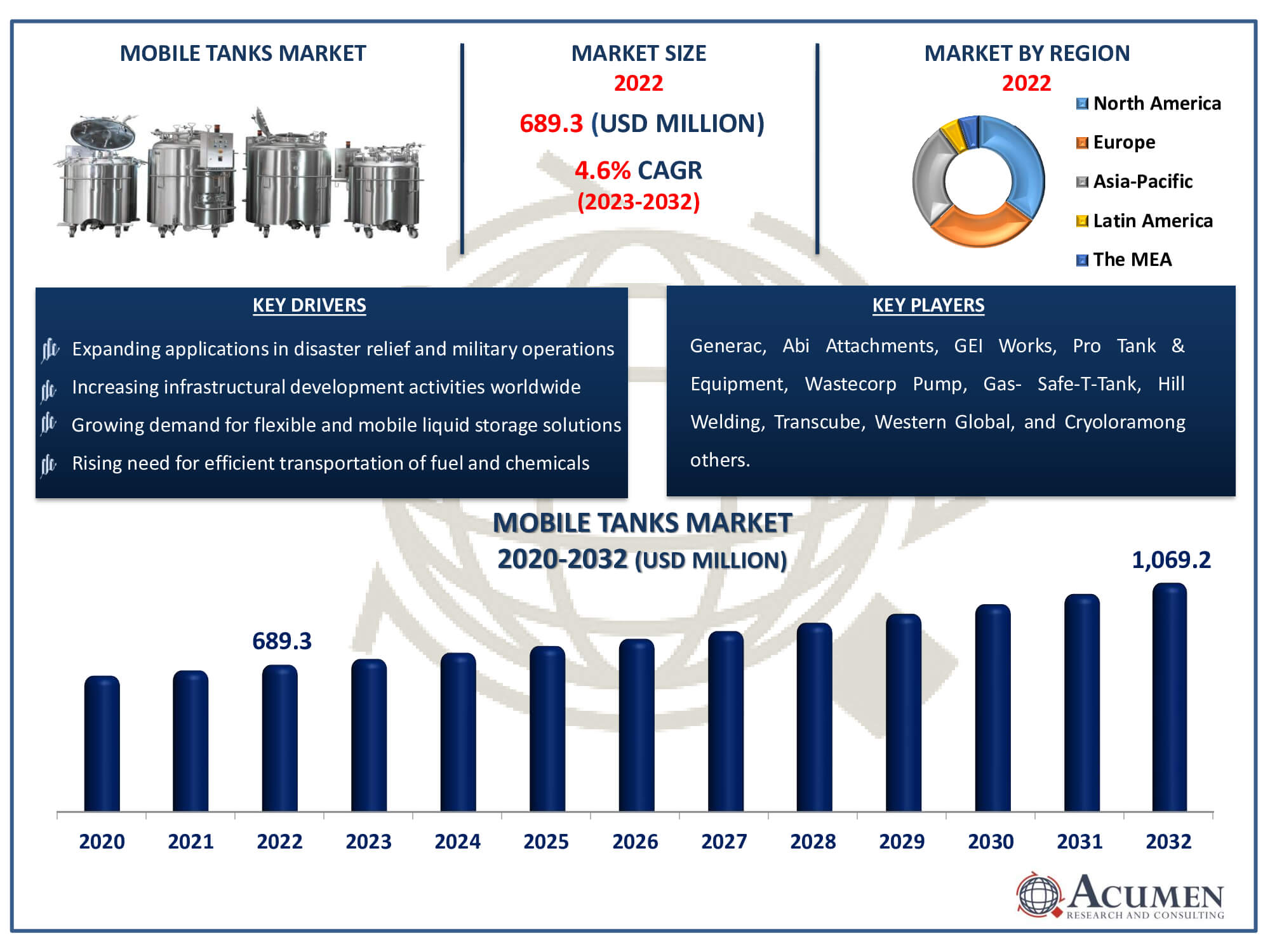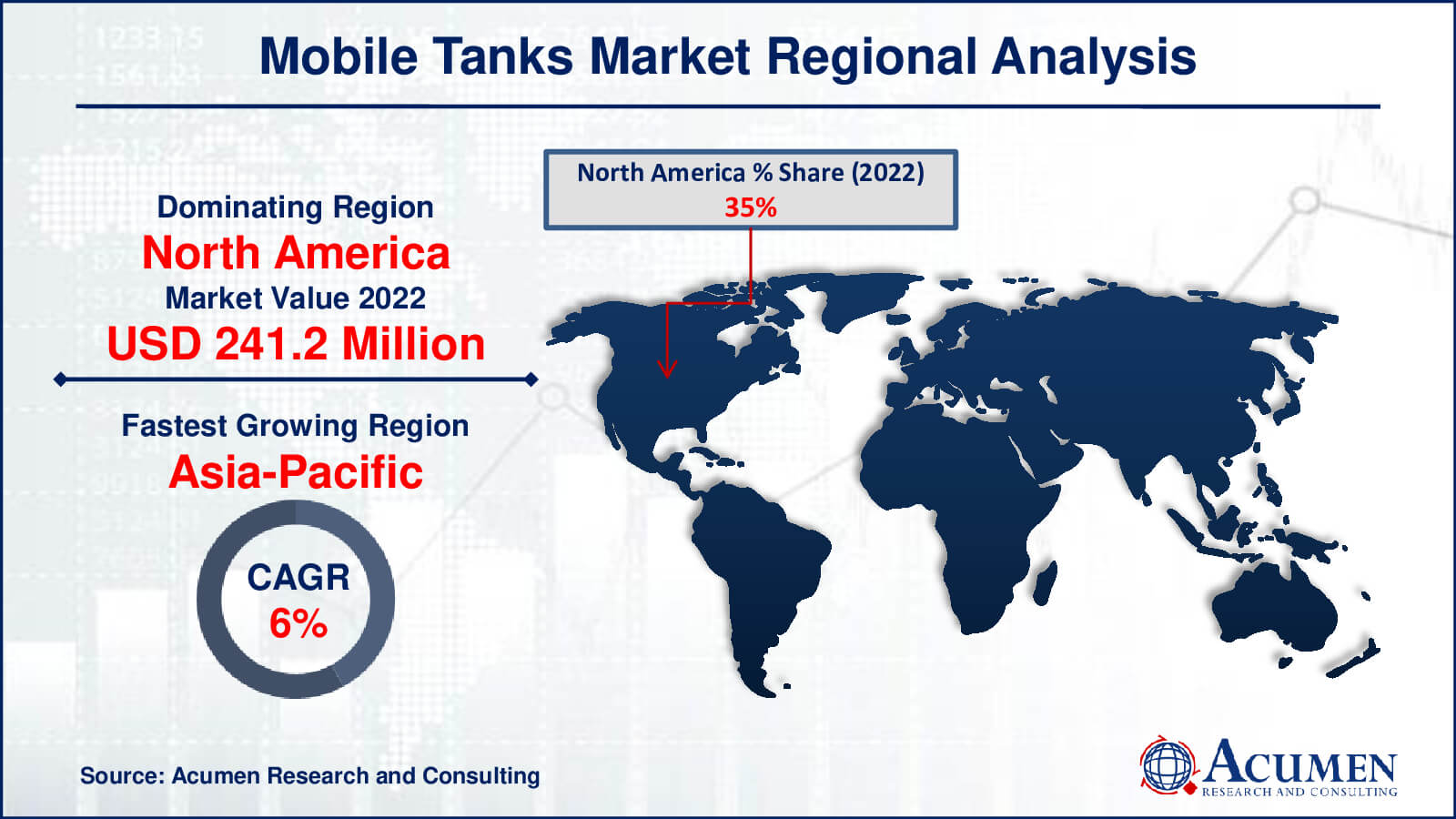Mobile Tanks Market | Acumen Research and Consulting
Mobile Tanks Market Size - Global Industry, Share, Analysis, Trends and Forecast 2023 - 2032
Published :
Report ID:
Pages :
Format :
The Mobile Tanks Market Size accounted for USD 689.3 Million in 2022 and is estimated to achieve a market size of USD 1,069.2 Million by 2032 growing at a CAGR of 4.6% from 2023 to 2032.
Mobile Tanks Market Highlights
- Global mobile tanks market revenue is poised to garner USD 1,069.2 million by 2032 with a CAGR of 4.6% from 2023 to 2032
- North America mobile tanks market value occupied around USD 241.2 million in 2022
- Asia-Pacific mobile tanks market growth will record a CAGR of more than 6% from 2023 to 2032
- Among material type, the high-density polyethylene (HDPE) sub-segment generated noteworthy revenue in 2022
- Based on end use, the oil & gas sub-segment generated significant share in 2022
- Customization of mobile tank solutions to meet specific industry requirements is a popular mobile tanks market trend that fuels the industry demand

In general, the term mobile tank refers to tanks or portable containers that are made to be easily moved from one place to another. These tanks facilitate the transfer of liquids like fuel, oil, water, or chemicals as they are often installed on trailers, vehicles, or other mobile platforms. Mobile tanks are useful for a variety of tasks in different sectors, particularly when frequent transfer or temporary storage is required. The capacity to handle various liquid types, durability, and simplicity of mobility are some of the key advantages of mobile tanks. They are commonly employed in industries such as construction, oil and gas, military operations, disaster assistance, and agriculture, among others, where the mobile storage and transportation of liquids is crucial. Infrastructural development activities are taking place across the globe, and governments are focusing on the development of outskirts regions. Continuous construction activities are being carried out to bridge this development gap, and mobile tanks are expected to be a more cost-effective transportation solution for carrying fuel, oil, and water to various remote areas.
Global Mobile Tanks Market Dynamics
Market Drivers
- Growing demand for flexible and mobile liquid storage solutions
- Increasing infrastructural development activities worldwide
- Rising need for efficient transportation of fuel and chemicals
- Expanding applications in disaster relief and military operations
Market Restraints
- Stringent regulatory requirements for the transportation of hazardous materials
- High initial investment and maintenance costs
- Environmental concerns related to the storage and transport of certain liquids
Market Opportunities
- Advancements in materials and technology for improved mobile tank performance
- Emerging markets with untapped potential for mobile tank applications
- Integration of smart technologies for real-time monitoring and management
Mobile Tanks Market Report Coverage
| Market | Mobile Tanks Market |
| Mobile Tanks Market Size 2022 |
USD 689.3 Million |
| Mobile Tanks Market Forecast 2032 | USD 1,069.2 Million |
| Mobile Tanks Market CAGR During 2023 - 2032 | 4.6% |
| Mobile Tanks Market Analysis Period | 2020 - 2032 |
| Mobile Tanks Market Base Year |
2022 |
| Mobile Tanks Market Forecast Data | 2023 - 2032 |
| Segments Covered | By Tank Type, By Material Type, By End Use, And By Geography |
| Regional Scope | North America, Europe, Asia Pacific, Latin America, and Middle East & Africa |
| Key Companies Profiled | Generac, Abi Attachments, GEI Works, Pro Tank & Equipment, Wastecorp Pump, Gas- Safe-T-Tank, Hill Welding, Transcube, Western Global, and Cryolor. |
| Report Coverage |
Market Trends, Drivers, Restraints, Competitive Analysis, Player Profiling, Covid-19 Analysis, Regulation Analysis |
Mobile Tanks Market Insights
Major factors expected to drive the growth of the global mobile tanks market include the increasing need for water worldwide, along with the adoption of mobile tanks to supply water to remote locations. Additionally, a developing economic scenario, a flourishing oil & gas sector in developing countries, coupled with the demand for a mobile tank fleet to supply oil & gas to in-station and outstation units, is expected to further boost the growth of the mobile tanks market. Furthermore, the increasing demand for mobile tanks from the aviation industry for the proper distribution of fuel is expected to support the growth of the mobile tanks market.
However, fluctuations in raw material prices leading to high product costs and increased maintenance charges are major factors expected to hinder the growth of the global mobile tanks market. Additionally, limitations in storage capacity represent another factor restricting the adoption of mobile tanks, thus posing a challenge to the growth of the global market. Technological advancements in the development of advanced tank materials and the introduction of new innovative products with novel features are factors expected to create new revenue opportunities for players operating in the mobile tanks market over the mobile tanks industry forecast period. In addition, business expansion activities through strategic partnerships and agreements aimed at attracting more customers are expected to further support the revenue growth of the mobile tanks market.
Mobile Tanks Market Segmentation
The worldwide market for mobile tanks is split based on type, material type, end use, and geography.
Mobile Tanks Types
- Liquid Storage Tanks
- Gas Storage Tanks
- Dry Bulk Storage Tanks
Presently, the mobile tanks market is dominated by the gas storage tanks segment. The expansion of this market is being driven by the rising need for safe and effective storage of different gases, such as liquefied petroleum gas (LPG) and industrial gases. Gas storage tanks are essential for the storage and transportation of gases in several industries, including industrial, petrochemicals, and energy. Gas storage tanks are an essential part of meeting the storage needs of various sectors, which helps them maintain their leading share in the market for mobile tanks. Their adaptability and broad applicability further contributes to their dominant market position.
Mobile Tanks Material Types
- Carbon Steel
- High-Density Polyethylene (HDPE)
- Stainless Steel
According to the industry analysis, the material type segment of the global market is split into carbon steel, high-density polyethylene (HDPE), and stainless steel. The high-density polyethylene (HDPE) segment is expected to witness substantial revenue growth, owing to factors such as HDPE being lightweight, non-corrosive, and chemical-resistant in nature. High-density polyethylene (HDPE) has high density, and these tanks are cost-effective with low maintenance costs compared to other tank materials.
Mobile Tanks End Uses
- Chemical
- Oil & Gas
- Aviation
- Others (agriculture, water and wastewater treatment, or other industrial processes)
The oil & gas industry is the one that contributes the most to the growth of the mobile tanks market when it comes to end-use sectors. The requirement for effective storage and transportation of petroleum products, crude oil, and different chemicals is what drives the demand for mobile tanks in the oil and gas industry. The significance of this industry may be ascribed to the vital function that these movable tanks perform in bolstering the exploration, production, and distribution endeavours of the oil and gas sector. Because of their intrinsic adaptability, mobile tanks are ideal for meeting the changing needs of the oil and gas industry, from fuel delivery to on-site storage during drilling operations. The oil & gas category is expected to hold its dominance as the global energy landscape changes, which is consistent with the industry's continued reliance on mobile tanks for safe and efficient fluid management.
Mobile Tanks Market Regional Outlook
North America
- U.S.
- Canada
Europe
- U.K.
- Germany
- France
- Spain
- Rest of Europe
Asia-Pacific
- India
- Japan
- China
- Australia
- South Korea
- Rest of Asia-Pacific
Latin America
- Brazil
- Mexico
- Rest of Latin America
The Middle East & Africa
- South Africa
- GCC Countries
- Rest of the Middle East & Africa (ME&A)

Mobile Tanks Market Regional Analysis
The North American market is expected to contribute a significant revenue share in the global mobile tanks market. This can be attributed to the rising energy demand, leading to increased oil & gas drilling activities, along with the deployment of mobile tanks in remote areas for fuel transportation. Additionally, the presence of major players operating in this region and the introduction of new models with advanced features are expected to further support the growth of the target market in North America.
The Asia-Pacific market is expected to witness faster growth in the mobile tanks market forecast period, driven by rapid industrialization in developing economies such as India and China. Major players are shifting their manufacturing units to these developing countries due to the easy availability of raw materials and low-cost labor. This shift is resulting in growing industrial activities, and mobile tanks are anticipated to be a more reliable and cost-effective solution for players operating in the outskirts of cities. Furthermore, rising water shortage issues in some regions, coupled with the adoption of mobile tanks to supply water to distant places, are expected to further support the growth of the target market in this region.
Mobile Tanks Market Players
Some of the top Mobile Tanks companies offered in our report includes Generac, Abi Attachments, GEI Works, Pro Tank & Equipment, Wastecorp Pump, Gas- Safe-T-Tank, Hill Welding, Transcube, Western Global, and Cryolor.
Frequently Asked Questions
How big is the mobile tanks market?
The mobile tanks market size was valued at USD 689.3 million in 2022.
What is the CAGR of the global mobile tanks market from 2023 to 2032?
The CAGR of mobile tanks is 4.6% during the analysis period of 2023 to 2032.
Which are the key players in the mobile tanks market?
The key players operating in the global market are including Generac, Abi Attachments, GEI Works, Pro Tank & Equipment, Wastecorp Pump, Gas- Safe-T-Tank, Hill Welding, Transcube, Western Global, and Cryolor.
Which region dominated the global mobile tanks market share?
North America held the dominating position in mobile tanks industry during the analysis period of 2023 to 2032.
Which region registered fastest CAGR from 2023 to 2032?
Asia-Pacific region exhibited fastest growing CAGR for market of mobile tanks during the analysis period of 2023 to 2032.
What are the current trends and dynamics in the global mobile tanks industry?
The current trends and dynamics in the mobile tanks industry include growing demand for flexible and mobile liquid storage solutions, increasing infrastructural development activities worldwide, rising need for efficient transportation of fuel and chemicals, and expanding applications in disaster relief and military operations.
Which end use held the maximum share in 2022?
The oil & gas end use held the maximum share of the mobile tanks industry.


